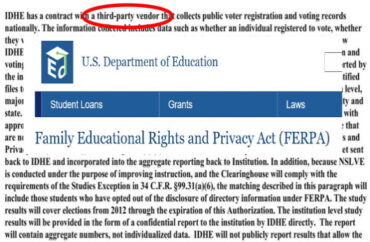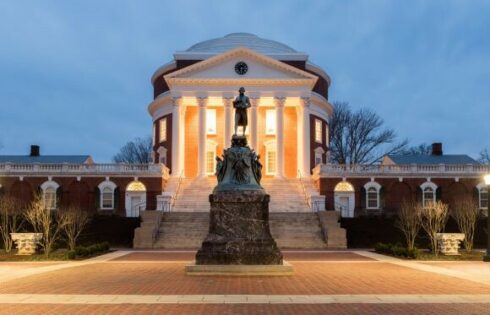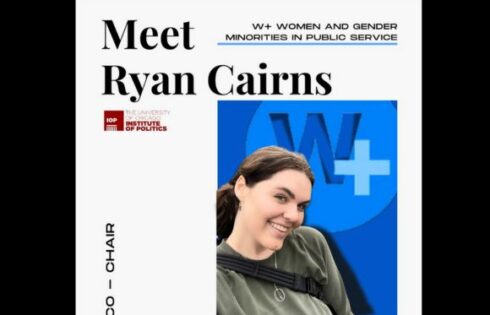
Universities nationwide each year hand over students’ private information to a third-party vendor that reviews their personal data to help study students’ voting trends — a practice that some watchdogs argue flouts privacy laws.
The third-party vendor may still retain the valuable data of college-aged students, who mostly vote Democrat. There is no mechanism for ensuring it’s deleted or not used in some way for get-out-the-vote efforts, some election integrity experts argue.
What’s more, they argue, the voting trends study doesn’t meet the FERPA exemption required to release the data, which states it must be used to improve academic instruction.
“Under FERPA, institutions cannot disclose education data without express written permission from the student unless they meet a series of certain very narrow exceptions, such as in a health or safety emergency, or when necessary to improve instruction,” Sarah Perry, a senior legal fellow at the Heritage Foundation, told The College Fix via email.
At issue is a 14-year-old national voting study run out of Tufts’ Institute for Democracy in Higher Education.
It prompts administrators from across the country to agree to release their students’ Family Educational Rights and Privacy Act, or FERPA, enrollment data from the National Student Clearinghouse, where it’s kept, to a third-party voter data company. That company removes the students’ personal data and hands the cleansed info to Tufts.
Perry said that doesn’t comply with privacy rules.
“Tufts’ institute’s National Study of Learning, Voting, and Engagement has claimed that the requested voter information is necessary to ‘improve education,’ and geared toward ‘educating for democracy.’ That doesn’t pass the smell test,” she said.
The National Study of Learning, Voting, and Engagement data are the result of matching student enrollment records with public voting files, Tufts’ FAQ section states. More than 1,200 campuses participate in the study.
For a university to participate, its leaders sign a two-page contract that states administrators are allowing the National Student Clearinghouse to release their students’ FERPA data to a “third party vendor,” a company not named in the contract, according to the 2022-2033 reauthorization form, as The College Fix has previously reported.
Tufts has stated that data collected is “de-identified” by the third-party vendor by removing names, identification numbers and month and day of birth, but keeps information such as school attended, major, race, ethnicity, sex, and year of birth.
But a July 2023 report from Verity Vote, a group concerned with government transparency and election integrity, argues the de-identification is “superficial.” It states “the collection of attributes retained in the data can be used to identify individuals just as the cookies on your browser can be used to identify you.”
The Tufts voter trends study launched in 2012 after the Obama administration called for Democrats to assemble “the perfect list” of targetable voters for get-out-the-vote efforts, the report states.
“Despite the assurance that the third party vendor will delete data that it did not already have, there is no FERPA exemption for temporarily receiving and manipulating the data. There is also no mechanism to verify deletion of the NSC data from the vendor’s database,” it states.
Cleta Mitchell, a senior legal fellow at the Conservative Partnership Institute, said the Democrats have created a clever scheme to access valuable voter data.
“The left has created a very sophisticated system for obtaining valuable, non-public data about each student … without the knowledge or consent of the student,” Mitchell said via email to The College Fix.
While the Tuft study may analyze student voting trends — the project has the added bonus of helping galvanize college-aged Democrat voters, she said.
“This system is designed to identify college students who are likely to vote for Democrat candidates,” she said.
“With same day registration, student IDs allowed for voting, and campus polling locations, plus the vast resources devoted to getting out the college student vote, the left has created a remarkable system that is based on the original data from the FERPA forms. Everything flows from that. And it is paying off,” she said.
One major point of contention is whether the data handed over is truly to improve academic instruction, which would allow the exemption for it to be released. FERPA does not prohibit the disclosure of properly de-identified student data for educational purposes.
“If it’s de-identified, then it’s just considered data, not education records,” Leroy Rooker, former director of the U.S. Department of Education’s Family Policy Compliance Office, which handles the implementation of FERPA.
“Based on the totality of the information, somebody can identify the student, and then it’s still going to be an education record.”
MORE: Concerns raised over universities signing over students’ private FERPA data to voter data companies
Like The College Fix on Facebook / Follow us on Twitter





Please join the conversation about our stories on Facebook, Twitter, Instagram, Reddit, MeWe, Rumble, Gab, Minds and Gettr.